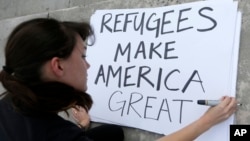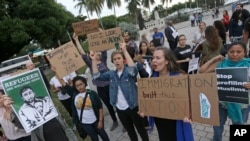President Donald Trump has signed two executive actions designed to enhance U.S. security, the more far-reaching of which restricts any Syrian refugees from entering the United States for an indefinite period of time.
Friday's executive order titled "Protecting the Nation from Foreign Terrorist Entry into the United States," calls for suspension of visas and other immigration benefits to citizens of "countries of particular concern."
Two United Nations agencies issued a joint statement Saturday just hours after Trump's order, saying "The needs of refugees and migrants worldwide have never been greater, and the U.S. resettlement program is one of the most important in the world."
The U.N. Refugee Agency and the International Organization for Migration said they hope the "U.S. will continue its strong leadership role and long tradition of protecting those who are fleeing conflict and persecution." The agencies said they "strongly believe that refugees should receive equal treatment for protection and assistance, and opportunities for resettlement, regardless of their religion, nationality or race."
Trump signed the order Friday at the Pentagon where he participated in a swearing-in ceremony for Defense Secretary James Mattis. Soon after the president's action protesters staged a demonstration at the main federal office building in New York.
As a reason for the order, the document cites the September 11, 2001, attacks on New York and Washington, which were carried out by 19 foreigners who obtained visas to enter the United States without difficulty. It refers to other terrorism-related crimes committed over the past 15 years by foreign nationals who entered the United States using either short-term visas - as visitors, students or temporary workers - or as refugees seeking resettlement in the U.S.
Averting attacks
"Deteriorating conditions in certain countries due to war, strife, disaster and civil unrest increase the likelihood that terrorists will use any means possible to entered the United States," the order states, and it calls for greater vigilance and caution by American consular officials before visas are granted.
The order does not spell out which countries are "of particular concern," although it authorizes the Department of Homeland Security to keep track of nations that do not provide adequate information about their citizens. White House officials indicated earlier this week that Iran, Iraq, Syria, Sudan, Libya, Yemen and Somalia would be an initial list of countries "of concern," but the order noted additions to the list could be made at any time.
As reported earlier when drafts of Trump's planned action circulated in Washington several days ago, the official text forbids the entry into the United States of any Syrian refugees for an indefinite period, until the president determines "that sufficient changes have been made ... to ensure that admission of Syrian refugees is consistent with the national interest."
The order also suspends operations of the U.S. Refugee Admissions Program for 120 days, while the Secretary of State and other officials reevaluate procedures "to ensure that those approved for refugee admission do not pose a threat to the security and welfare of the United States." It also limits the number of refugees that may be admitted to the United States to 50,000 during fiscal 2017, the 12-month period that ends on September 30.
Who will be affected?
The president said Friday that only people who support the United States should be allowed into the country. The executive order he signed discussed identification and verification procedures that U.S. consular officers should use in extensive detail.
Under the general topic of terrorism, the executive order directed U.S. officials to watch for "gender-based violence against women, including 'honor killings," and called for the gathering of "any other information relevant to public safety and security."
"We don't want them here," said Trump. "We want to make sure that we are not admitting into our country the very threats our soldiers are fighting overseas. We only want to admit those into our country who will support our country and love deeply our people."
Peter Brookes, a senior fellow of national security affairs at Heritage Foundation, said the ban is “essentially a pause” being used by the new administration to review past programs and policies. He said it was an important step needed to avoid “the problems that we have seen Europe suffer at hands of people who have either been recent refugees or come in posing as refugees.”
Brookes noted that recent gains made by coalition forces fighting against the Islamic State group in Syria and Iraq are putting pressure on the Islamic extremists, making it more likely they might try to flee to other countries.
“I think ISIS is in crisis. It is under significant pressure in both Mosul and Raqqa. The caliphate is going to crumble at some point in the future and those fighters are going to go somewhere. They may try to return home or may try to go to other countries,” he said.
Others say the threat of terrorism from refugees is overblown, however, and the U.S. has a duty to accept people from these war-torn countries.
“There is really a very limited risk of refugees committing crimes or acts of terrorism and there is a lot of statistics about that,” Benjamin Friedman, a research fellow in defense and homeland security studies at the CATO institute, said. “Particularly with regards to Iraq, Libya and to a lesser extent Syria I think the United States has a unique responsibility to accept immigrants refugees included because we helped destabilize those countries.”
Mark Hetfield of the Hebrew Immigrant Aid Society, added, "It's clear that President Trump has decided to pick on refugees. ... This is going to cost tens of thousands, hundreds of thousands of people their lives, because they won't find protection here. They won't find protection anywhere."
Busy courts
Former New York prosecutor Paul Callan said Friday that he expects the refugee order will generate a great deal of legal activity, particularly if people already in the United States are affected.
"You can block people from coming into the country, but once they're in, all persons have constitutional protections if they're in the United States. And certainly, if there is a claim that those constitutional rights are being violated by an executive order, that claim would go to the U.S. Supreme Court."
A Syrian asylum-seeker told VOA “refuges are victims, not terrorists.”
“I applied for asylum from inside the U.S. in late 2014. I've been in the process for more than two years and I didn't get my asylum yet. That shows how long the vetting process is and how stringent the security checks are,” said Middle East Institute resident fellow Ibrahim Al Assil.
“President Trump’s suspension of the U.S. Refugee Admission Program for 120 days and indefinite halt of refugee processing and admittance of Syrian refugees is in disregard for human rights,” added Assil who co-founded the Syrian Nonviolence Movement, “this is a fundamental violation of the right to seek asylum in accordance with the 1951 Refugee Convention.”
The 1951 Refugee Convention is the key document that defines the term “refugee” and outlines the rights of the displaced, as well as the legal obligations of States to protect them.
Policy review
Also Friday, Trump signed a presidential memorandum directed at the new secretary of defense and the Office of Budget Management, outlining their responsibilities for evaluating the nation's security policies.
An executive memorandum differs from an executive order in that it is directed at a specific federal agency. An executive order is always entered into the Federal Register, the official daily journal of U.S. government activity. While memoranda may not be formally recorded in the Federal Register, both types of presidential action carry the force of law.
Trump said the memorandum regarding national security was intended to better support the U.S. military.
"Believe me," the president said, "first I'm signing an executive action to begin a great rebuilding of the armed services of the United States, developing a plan for new planes, new ships, new resources, and new tools for our men and women in uniform. And I'm very proud to be doing that."
The memorandum, proclaiming a policy of pursuing "peace through strength," said the new secretary must conduct a 30-day readiness review assessing training, equipment maintenance, munitions, modernization, and infrastructure of the current armed forces. It tasks the new secretary with submitting to the president a report and a plan within 60 days, identifying actions that can be implemented within the current fiscal years to improve readiness.
The memorandum says Mattis must initiate a new Nuclear Posture Review to make sure the U.S. nuclear deterrent is "modern, robust, flexible, resilient, ready, and appropriately tailored to deter 21st-century threats and reassure" U.S. allies.
VOA's Nike Ching, Fern Robinson and Hasib Alikozai contributed to this report.








